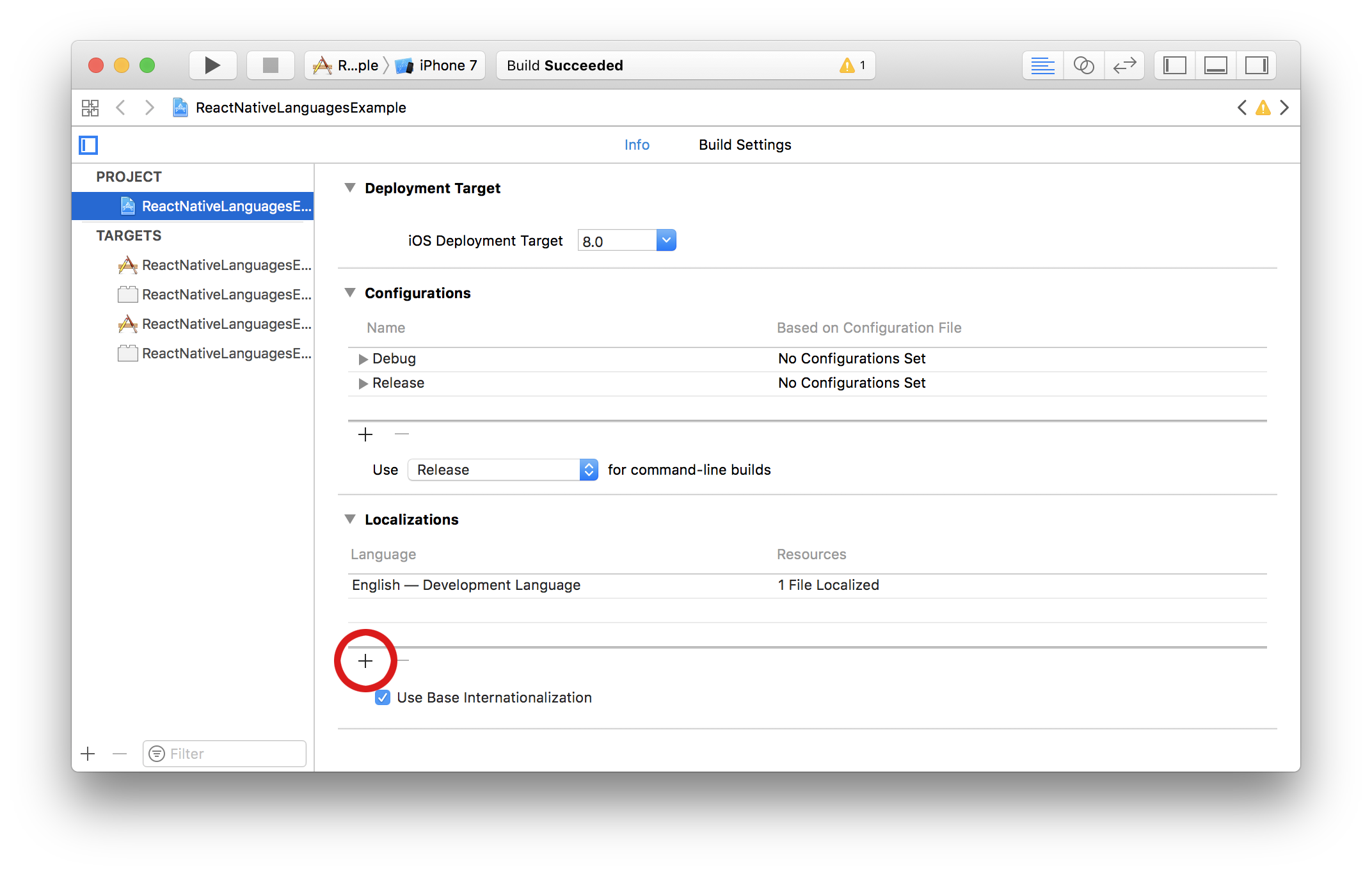react-native-localize-tvos10
v1.4.0
Published
A toolbox for your React Native app localization.
Downloads
7
Maintainers
Readme
🌍 react-native-localize
A toolbox for your React Native app localization.
Support
| package name | version | react-native version | | ---------------------- | ------- | -------------------- | | react-native-localize | 1.0.0+ | 0.56.0+ | | react-native-languages | 2.0.1 | 0.48.0 - 0.55.4 |
Setup
$ npm install --save react-native-localize
# --- or ---
$ yarn add react-native-localizeDon't forget to run pod install after that !
🆘 Manual linking
Because this package targets React Native 0.60.0+, you will probably don't need to link it manually. Otherwise if it's not the case, follow this additional instructions:
iOS
Add this line to your ios/Podfile file, then run pod install.
target 'YourAwesomeProject' do
# …
pod 'RNLocalize', :path => '../node_modules/react-native-localize'
endAndroid
- Add the following lines to
android/settings.gradle:
include ':react-native-localize'
project(':react-native-localize').projectDir = new File(rootProject.projectDir, '../node_modules/react-native-localize/android')- Add the implementation line to the dependencies in
android/app/build.gradle:
dependencies {
// ...
implementation project(':react-native-localize')
}- Add the import and link the package in
MainApplication.java:
import com.reactcommunity.rnlocalize.RNLocalizePackage; // <- add the RNLocalizePackage import
public class MainApplication extends Application implements ReactApplication {
// …
@Override
protected List<ReactPackage> getPackages() {
@SuppressWarnings("UnnecessaryLocalVariable")
List<ReactPackage> packages = new PackageList(this).getPackages();
// …
packages.add(new RNLocalizePackage());
return packages;
}
// …
}Web support
This package supports react-native-web. Follow their official guide to configure webpack.
Basic usage example
import * as RNLocalize from "react-native-localize";
console.log(RNLocalize.getLocales());
console.log(RNLocalize.getCurrencies());
RNLocalize.addEventListener("change", () => {
// do localization related stuff…
});API
getLocales()
Returns the user preferred locales, in order.
Method type
type getLocales = () => Array<{
languageCode: string;
scriptCode?: string;
countryCode: string;
languageTag: string;
isRTL: boolean;
}>;Usage example
console.log(RNLocalize.getLocales());
/* -> [
{ countryCode: "GB", languageTag: "en-GB", languageCode: "en", isRTL: false },
{ countryCode: "US", languageTag: "en-US", languageCode: "en", isRTL: false },
{ countryCode: "FR", languageTag: "fr-FR", languageCode: "fr", isRTL: false },
] */getNumberFormatSettings()
Returns number formatting settings.
Method type
type getNumberFormatSettings = () => {
decimalSeparator: string;
groupingSeparator: string;
};Usage example
console.log(RNLocalize.getNumberFormatSettings());
/* -> {
decimalSeparator: ".",
groupingSeparator: ",",
} */getCurrencies()
Returns the user preferred currency codes, in order.
Method type
type getCurrencies = () => Array<string>;Usage example
console.log(RNLocalize.getCurrencies());
// -> ["EUR", "GBP", "USD"]getCountry()
Returns the user current country code (based on its device locale, not on its position).
Method type
type getCountry = () => string;Usage example
console.log(RNLocalize.getCountry());
// -> "FR"getCalendar()
Returns the user preferred calendar format.
Method type
type getCalendar = () => "gregorian" | "japanese" | "buddhist";Usage example
console.log(RNLocalize.getCalendar());
// -> "gregorian"getTemperatureUnit()
Returns the user preferred temperature unit.
Method type
type getTemperatureUnit = () => "celsius" | "fahrenheit";Usage example
console.log(RNLocalize.getTemperatureUnit());
// -> "celsius"getTimeZone()
Returns the user preferred timezone (based on its device settings, not on its position).
Method type
type getTimeZone = () => string;Usage example
console.log(RNLocalize.getTimeZone());
// -> "Europe/Paris"uses24HourClock()
Returns true if the user prefers 24h clock format, false if he prefers 12h clock format.
Method type
type uses24HourClock = () => boolean;Usage example
console.log(RNLocalize.uses24HourClock());
// -> trueusesMetricSystem()
Returns true if the user prefers metric measure system, false if he prefers imperial.
Method type
type usesMetricSystem = () => boolean;Usage example
console.log(RNLocalize.usesMetricSystem());
// -> trueusesAutoDateAndTime()
Tells if the automatic date & time setting is enabled on the phone. Android only
Method type
type Option<T> = T | undefined;
type usesAutoDateAndTime = () => Option<boolean>;Usage example
console.log(RNLocalize.usesAutoDateAndTime()); // true or falseusesAutoTimeZone()
Tells if the automatic time zone setting is enabled on the phone. Android only
Method type
type Option<T> = T | undefined;
type usesAutoTimeZone = () => Option<boolean>;Usage example
console.log(RNLocalize.usesAutoTimeZone());addEventListener() / removeEventListener()
Allows you to listen for any localization change.
Methods type
type addEventListener = (type: "change", handler: Function) => void;
type removeEventListener = (type: "change", handler: Function) => void;Usage example
function handleLocalizationChange() {
console.log(RNLocalize.getLocales());
}
RNLocalize.addEventListener("change", handleLocalizationChange);
// …later (ex: component unmount)
RNLocalize.removeEventListener("change", handleLocalizationChange);findBestAvailableLanguage()
Returns the best language tag possible and its reading direction (⚠️ it respects the user preferred languages list order, see explanations). Useful to pick the best translation available.
Method type
type findBestAvailableLanguage = (
languageTags: Array<string>,
) => { languageTag: string; isRTL: boolean } | void;Usage example
console.log(RNLocalize.findBestAvailableLanguage(["en-US", "en", "fr"]));
// -> { languageTag: "en-US", isRTL: false }Examples with i18n-js
Browse the files in the /example directory.
How to test your code
Because it's a native module, you might need to mock this package to run your tests flawlessly. Here is an example for Jest, adapt it to your needs :
// __mocks__/react-native-localize.js
const getLocales = () => [
// you can choose / add the locales you want
{ countryCode: "US", languageTag: "en-US", languageCode: "en", isRTL: false },
{ countryCode: "FR", languageTag: "fr-FR", languageCode: "fr", isRTL: false },
];
// use a provided translation, or return undefined to test your fallback
const findBestAvailableLanguage = () => ({
languageTag: "en-US",
isRTL: false,
});
const getNumberFormatSettings = () => ({
decimalSeparator: ".",
groupingSeparator: ",",
});
const getCalendar = () => "gregorian"; // or "japanese", "buddhist"
const getCountry = () => "US"; // the country code you want
const getCurrencies = () => ["USD", "EUR"]; // can be empty array
const getTemperatureUnit = () => "celsius"; // or "fahrenheit"
const getTimeZone = () => "Europe/Paris"; // the timezone you want
const uses24HourClock = () => true;
const usesMetricSystem = () => true;
const addEventListener = jest.fn();
const removeEventListener = jest.fn();
export {
findBestAvailableLanguage,
getLocales,
getNumberFormatSettings,
getCalendar,
getCountry,
getCurrencies,
getTemperatureUnit,
getTimeZone,
uses24HourClock,
usesMetricSystem,
addEventListener,
removeEventListener,
};Add project's supported localizations (iOS)





